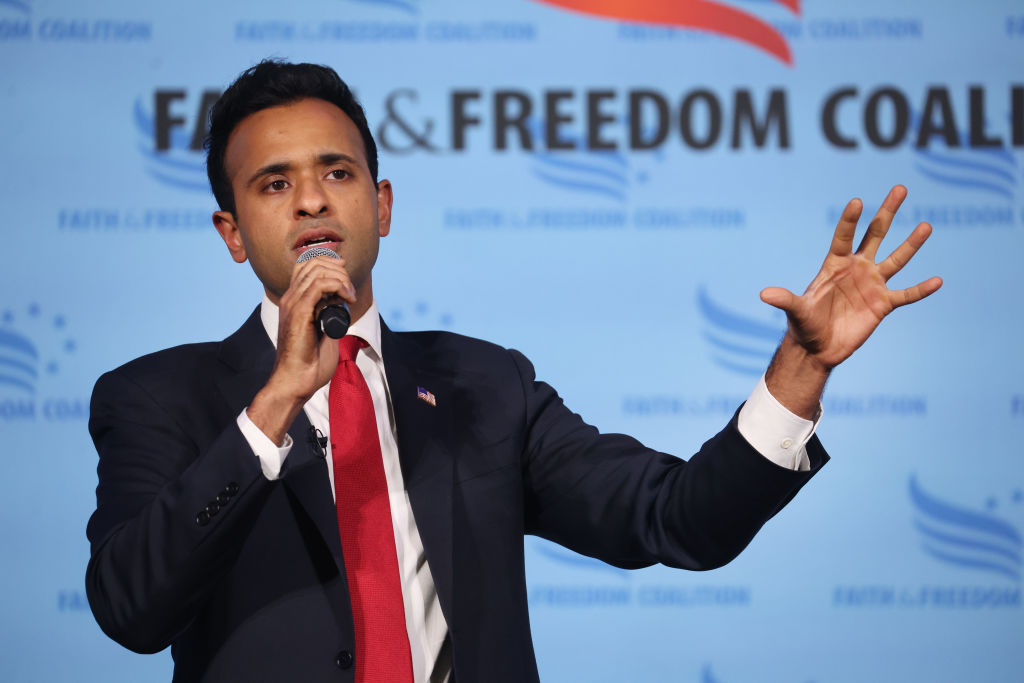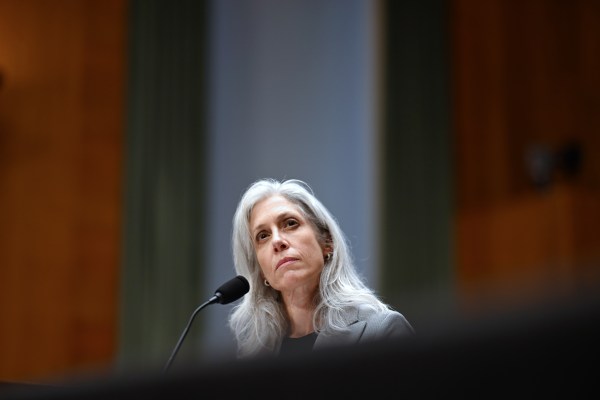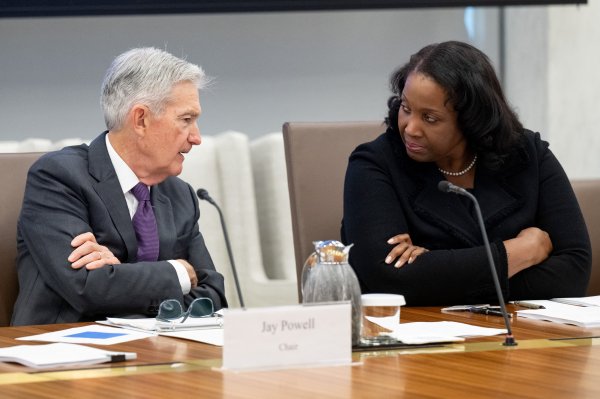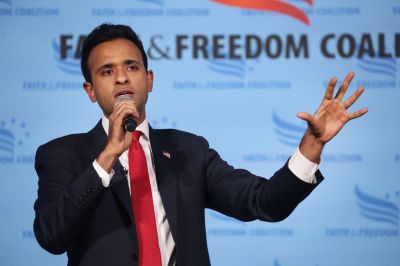URBANDALE, Iowa—It could be the punchline to a joke: A hotshot megamillionaire CEO with Ivy League degrees in biology and law decides to run for president, marches into an Iowa diner decorated with farm tools, and tries to connect with heartland voters by telling them he’s been censored on LinkedIn.
But for many listeners, Vivek Ramaswamy’s upstart campaign is no joke. Indeed, his earnest diagnosis of America’s problems—political subjugation to the federal bureaucracies, economic subjugation to China, spiritual decay and loss of national purpose—strikes a chord.
“I’m 73 years old—I’ve never experienced a candidate like him,” said local retiree James Gilson. “I think he’s authentically a man of the people, an incredible intellect, and can think in different directions.” His wife called Ramaswamy “by far the smartest politician we’ve ever heard, and we agree with many of his ideas.”
The natural question when Ramaswamy announced his campaign for president in February on a now-defunct Fox News show: Is this guy for real? Now, as he campaigns through Iowa and New Hampshire, successfully qualifies for primary debates, and makes incremental progress in the primary polls (he hit his single-poll high-water mark of 8 percent last week) it seems clear the answer is yes. He’s a longshot, but that doesn’t mean he’s not running to win.
Ramaswamy has made hundreds of millions of dollars since founding pharmaceutical company Roivant Sciences in 2014, yet he used to be largely unknown outside business circles. (Even now, less than half of Americans say they’ve heard his name.) His swerve into political commentary came in 2020, first as a rare outspoken corporate opponent of the Black Lives Matter movement, then as a critic of progressive political groupthink in corporate America. He became known as a sort of guru of the burgeoning “anti-woke” movement, firing off regular op-eds in the Wall Street Journal (and even these august pages), making dozens of appearances on Fox News, and writing three books: Woke, Inc., Nation of Victims, and Capitalist Punishment. He launched a new politics-inflected business, Strive Asset Management, as a response to the supposedly progressive-inflected investment strategies of huge financial managers like Blackrock and Vanguard. He dined with former President Donald Trump and made panel appearances with Florida Gov. Ron DeSantis.
Eventually he decided to run for office. There was never a question of which one: “It was a question of how am I gonna have the maximal impact on the country at this moment in American history,” Ramaswamy told The Dispatch. “I felt like I had a vision for the country that speaks to every generation as a young American, that I thought I could have an even bigger impact on the country by leading a national revival as Reagan did in 1980.”
The only person in Republican politics he consulted, he said, was Tucker Carlson. At 37 years old, this is the first presidential election in which he’s constitutionally eligible to run.
“He’s someone who doesn’t normally take ‘no’ as a given,” William Symonds, a scientist who cofounded Roivant alongside Ramaswamy, told The Dispatch. “He doesn’t have that little voice in his head saying, ‘Ah, don’t bother asking—they’re never gonna go for that.’”
Now in a nominating contest dominated by Trump and DeSantis, Ramaswamy is working hard to be the third name to break from the pack. He’s invested $10 million of his own money and has suggested he could invest up to $90 million more. He’s hired a team of well-connected veteran operatives. (Too well-connected, in some cases: Ramaswamy this week fired two advisers after it was revealed they had been doing simultaneous PR for the Saudi-funded LIV Golf league.) He’s taking shots at the frontrunners, saying Trump’s fixation on “vengeance and grievance” limited his effectiveness as president and scoffing that DeSantis lifted much of his own anti-woke playbook from Ramaswamy. And he’s deployed a strategy designed to set him apart from the press-skittish Republican pack: taking every interview request, answering every voter question, keeping to a grueling schedule of grassroots events.
It’s helped him land several splashy earned-media moments—most notably a fiery CNN exchange over gun rights and race relations in which anchor Don Lemon lost his cool and sneered at “you sitting here, whatever ethnicity you are, ‘splaining to me what it’s like to be black in America.” That exchange reportedly contributed to Lemon’s CNN firing soon after, as Ramaswamy is happy to note.
“This is how we win, okay? We show up and engage,” Ramaswamy said last week at the Machine Shed, a restaurant near Des Moines that’s become a common stop for presidential hopefuls. Other candidates, he said, are reluctant to engage with mainstream media or unfriendly audiences. “I get where they’re coming from, but my view is different,” Ramaswamy continued. “We’re on the winning side of our pro-American revival. So we’ll show up, we’ll argue for our side, and we’ll win.”
“Pro-American revival” is central to the Vivek pitch. A loss of national confidence and shared national purpose, he argues, have fostered the development of “cult-like belief systems” around climate change, the COVID pandemic, race relations, and gender ideology. He regularly invokes Ronald Reagan and the psychotherapist and Holocaust survivor Viktor Frankl, whose 1946 book Man’s Search for Meaning discussed the human need to be oriented toward a greater purpose.
“Do you think it’s a coincidence that we see the rise of these different cults at the same time?” he said at the Machine Shed. “We are hungry for purpose and meaning and identity, at a point in our national history when the things that used to fill that void—faith, patriotism, hard work, family—these things have disappeared. That leaves a moral vacuum in its wake, a black hole.”
The causes vary, but Ramaswamy argues as president he would strike against one in particular: the sclerotic federal agencies that wield ever-increasing political power, alienating the citizenry from its government.
“The people who we elect to run the government ought to be the ones who actually run the government, not this managerial bureaucracy that runs the show today,” he said.
Complaining about a bloated bureaucracy is classic Republican boilerplate, but Ramaswamy goes farther than most. He openly scorns the longstanding conservative notion that it’s the responsibility of Congress to reclaim the powers it has ceded over the years to the executive agencies.
“Congress and the Senate in theory could do it, but they won’t, because first of all, they’re bodies designed to work slowly,” he said at another event in Cedar Falls. “Put aside even the partisan gridlock. Even if you had majorities, even if you had Republican majorities, it’s not going to happen because it’s naturally consensus-driven.”
Nor is it sufficient, he argues, to “tinker around the edges” of agencies like the Department of Education as Trump did by installing Betsy Devos as education secretary. Instead, he’d take unilateral action to shut those agencies down.
“Because guess what? They’re long gone and the Department of Education is still here spending more money than ever, foisting radical racial and gender ideologies onto our schools,” he said at the Machine Shed. “You cannot tame the beast; you have to drain the beast.”
The executive agencies Ramaswamy targets exist because Congress has passed laws creating them, and current federal law requires the executive branch to spend the money appropriated for those agencies by Congress. But Ramaswamy says he’s prepared to challenge that relationship on constitutional grounds.
“I think working on the appropriation process and the relationship between the executive and the legislative branches, I think is the easiest and most peaceable manner of doing it,” he told The Dispatch in an interview. But should Congress prove recalcitrant, he also thinks he could make a constitutional argument that, as chief executive, the decision should lie with him whether to spend that appropriated money at all.
Even among the current crop of Republican candidates, this is an eye-popping pitch.
Trump instinctively distrusted restrictions on presidential power while in office: “I have an Article Two where I have the right to do whatever I want as president,” he said in 2019. But he never worked to uproot the federal bureaucracies in any systematic way, and even his current “Schedule F” proposal would only increase his powers to fire individual agency employees. While DeSantis has not shied away from wielding power as governor of Florida, he’s also made clear this stems in part from a deep belief in states’ rights, suggesting he could be more philosophically restrained as president.
In arguing for this radical reimagining of presidential executive power, Ramaswamy takes pains to always root his arguments in first principles—in this case, keeping the government accountable to the voters, since the president is elected and bureaucrats are not. He has a knack for taking a policy position popular with GOP voters and framing it as the natural flowering of a deep ideological belief. While other candidates tell voters they’d pardon some of those arrested in the January 6 Capitol riot, only Ramaswamy pairs that promise with a statement of concern for the lack of due process for the alleged terrorists still detained in Guantanamo Bay.
The effect is a testament to Ramaswamy’s rhetorical prowess. But a guy with a knack for making the sale runs the risk of eventually thinking he can sell anybody on anything.
As he barnstorms Iowa, one piece of culture clash comes up from time to time for Ramaswamy, the son of Indian immigrants: He’s Hindu. Most times it manifests in quiet ways, like his vegetarian diet. But Iowa Republicans trend heavily Christian, and sometimes they ask about it, as they did at an event last week at the Barn Happy craft store in Cedar Falls. Ramaswamy has a ready answer: “I’m not running to be your pastor, I’m running to be the president.” He goes on to highlight his education in a Christian high school, his belief in religious liberty, and his commitment, shared with his questioner, that America was founded on “Judeo-Christian values.”
“We can look at somebody who calls themselves Christian but doesn’t live by or really believe in Christian values, or someone who happened to be born into a Hindu household that believes in God, a single God, lives his life accordingly, but shares those same values in common,” Ramaswamy said. “I think it’s the shared values that actually matter.”
It’s nicely done. But one questioner goes farther: Given that Ramaswamy got a Christian education, had he looked into the evidence of the resurrection of Jesus Christ?
“I actually find the evidence quite compelling,” Ramaswamy responded. “I mean there is evidence, actually—people don’t look at this. I don’t think you should need that evidence to believe in the resurrection of Christ. Because faith is based on something greater than evidence. But it is interesting to note that it’s actually quite compelling when you look at this.”
This seemed striking enough to follow up on. What had he meant by that?
“There’s ancient evidence in Rome of people, human beings actually describing the rising of Christ,” Ramaswamy said in our interview. “Like our family truly believes that Christ was a form of God, just like God resides in all of us.”
And that he had actually risen from the dead?
“In the faith-based sense of that description, yes. I think there are many paths to truth.”
The man who asked the question, Tim Boettger of Cedar Falls, told The Dispatch he was highly impressed by Ramaswamy: “He’s more articulate, more thoroughly thought-through and can communicate it better than a lot of candidates that I hear—the depth of his conviction about it, the foundation of his beliefs, which I really like hearing.”
He wasn’t quite sure about that resurrection answer, though: “I feel like he maybe doesn’t understand the relevancy of, if a man did come back from the dead, that declares everything he said true. And he’s all about truth. … I would just hope, you know—he loves the truth, he’s pursuing the truth, and I would guess God will chase him down eventually.”






Please note that we at The Dispatch hold ourselves, our work, and our commenters to a higher standard than other places on the internet. We welcome comments that foster genuine debate or discussion—including comments critical of us or our work—but responses that include ad hominem attacks on fellow Dispatch members or are intended to stoke fear and anger may be moderated.
With your membership, you only have the ability to comment on The Morning Dispatch articles. Consider upgrading to join the conversation everywhere.